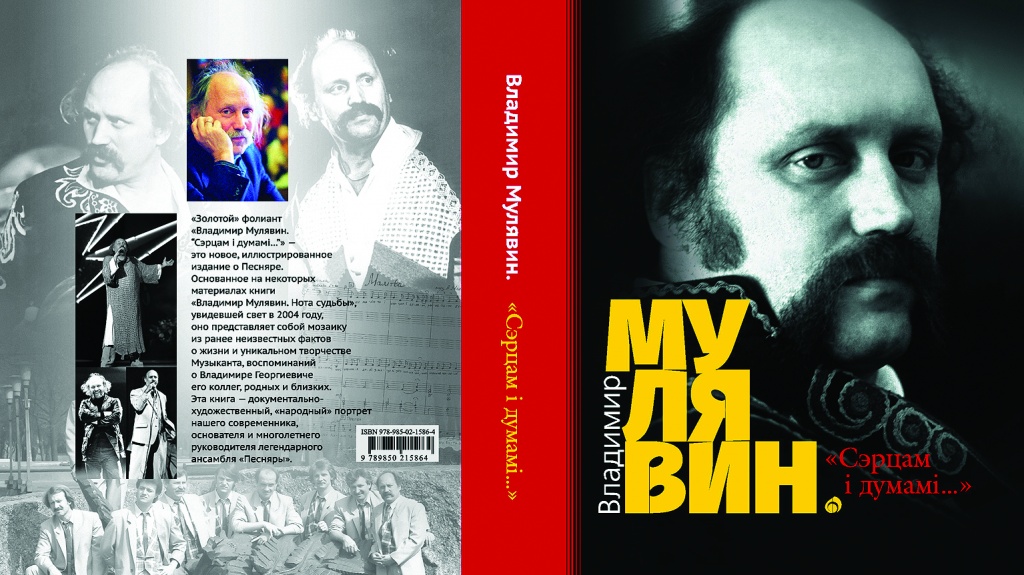‘Generally speaking, my best time is at dawn. When the day stretches ahead, you do not want to sleep any longer. It’s a time to reflect, look ahead into something unclear, perhaps incomprehensible occasionally with anxiety, but more often with hope that all will turn out well. At the heart of this morning loneliness you feel the force of life more clearly. My time is from 4 or 5am till 9 am in the morning, that’s when I write my music’.

These words are from an interview with Mulyavin at the end of the 1990s. His pure, lofty melodies are associated with the dawn, though in the life of this great person were many dark, twilight moments. His life in the memoirs of his friends and relatives, and through the revelations in ‘Pesnyar’ is fascinating, tragic and inspiring. His biography can be followed through the pages of the book from the Mastatskaya Litaratura Publishing House entitled, With Heart, with Thoughts, lines by Yanka Kupala from the song Prayer. Previously, the collection Vladimir Mulyavin. Note of Destiny from the series Life of Outstanding People of Belarus was issued in 2004. The current ‘golden’ volume, a project by Lyudmila Krushinskaya, is an artistic documentary offering a ‘national’ portrait of the musician. As well as Note of Destiny, it will undoubtedly become a best seller. Vladimir Mulyavin’s popularity was legendary and remains so even today. There is a fragment from the memoirs from his son about a trip to Indonesia, “In the morning father comes out on the balcony and says: ‘It is beautiful, ocean, palm trees and nobody knows me, at least I will have rest’. While under the balcony a group of young people, having seen father, shout: ‘Volodya, come down, let’s play volleyball!’ Father was shocked: ‘Well, well, that’s just terrific, the first trip, how do you like that?’”
In general, the book is extraordinarily interesting as it allows the reader to see Mulyavin in person, to glimpse into his creative laboratory. There is his first appearance on stage with Pesnyary: it was in Moscow at the 4th All-USSR contest of variety artists. When Pesnyary were announced, they were afraid and did not dare to appear on stage for a long time. They had got used to the previous name Lyavony. There are words from his wife, the actress Svetlana Penkina: ‘While generally he was always absolutely smart, he really hated to wear a suit, shirt and tie’. What else he did not like? Strangely enough, he did not like draniki (potato pancakes) because the dish reminded him of his hungry post-war Sverdlovsk childhood when his mother made draniki from potato peelings’.

Very few people have managed to do so much for the advancement of Belarusian culture in the world, as Vladimir Mulyavin — a Russian by birth. There are very few such self-sacrificing artistes. In Romania he had urgent surgery due to appendicitis. Having returned home, he continued his concerts. Svetlana Penkina recollects, “He started singing, when the stiches began to tear. Volodya began to see a spreading stain on his white suit and hid it with his guitar. His number ended, he went behind the scenes and told me: ‘You know, I was afraid that people would see the blood and be frightened’.” Take a note from his diary alone, “Pesnyary is not a token for spiritual people but a way of life and of thinking. For all my conscious life, I, studying Bogdanovich, Kupala, Kolas, admired them not only as poets, but also as people. Kupala did not make any compromises.”

Exhibits from Vladimir Mulyavin’s museum
Igor Luchenok, who was connected with Mulyavin by a long-term friendship, admits, “He remained for me an unsolved riddle.” A rare person with natural gifts! He was admitted to the Union of Composers without academic schooling or a composer’s diploma, in general without finished classical musical education that contradicted the charter of the organisation. But ‘Pesnyar’ was an exception! Igor Luchenok recollects trips with Mulyavin along Polesie, “It was interesting for me to observe Volodya, how he, a Russian, enthusiastically imbibed the national Belarusian melodies, how he listened and hastily wrote down wonderful songs which old men and women gave us, repeating: ‘My God, what riches, what riches!’”
The personality of Mulyavin is seen from different angles, described by members of his family, by Pesnyary, composers, photographers and artists. There are many unique illustrations. From the cover of the book, published later this year, a thoughtful ‘Pesnyar’ looks out and ‘with his heart and thoughts’ continues to pray for native Belarus.
By Lyudmila Rublevskaya











